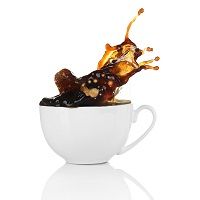Caffeine Addicted Colon Cancer Patients May See Improvements in Survival Rates
Caffeine addicts, rejoice. A recent study concluded that regularly consuming caffeinated coffee could potentially help inhibit the return of colon cancer post-treatment, eventually improving the chance for a cure.

Caffeine addicts, rejoice. A recent study concluded that regularly consuming caffeinated coffee could potentially help inhibit the return of colon cancer post-treatment, eventually improving the chance for a cure.
While this is the first study to examine the association between consuming caffeinated coffee and alleviating the risk of colon cancer recurrence, there have been several studies touting coffee’s protective benefits for reducing risks of postmenopausal breast cancer, melanoma, liver cancer, and advanced prostate cancer.
The Dana-Farber Cancer Institute study, published in the Journal of Clinical Oncology, included approximately 1,000 patients who were all treated with surgery and chemotherapy for stage III colon cancer.
Upon filling out dietary pattern questionnaires, the patients were either required to drink two to three or four or more cups of coffee each day.
The patients who consumed four or more cups of coffee were found to be 42% less likely to have their cancer return than non-coffee drinkers. Furthermore, this group was noted “33% less likely to die from cancer or any other cause”.
Comparatively, those consuming two to three cups of coffee benefited on a smaller scale and hardly any advantage was noted with drinking less than one cup.
According to Charles Fuchs, MD, MPH, director of the Gastrointestinal Cancer Center, Dana-Farber, the majority of colon cancer recurrences happen within five years of treatment. “We found that coffee drinkers had a lower risk of the cancer coming back and a significantly greater survival and chance of a cure.”
Despite the seemingly positive results, Fuchs wants to wait until future studies confirm these results before making mass recommendations to patients. Fuchs cautions, “If you are a coffee drinker and are being treated for colon cancer, don’t stop. But if you’re not a coffee drinker and wonder whether to start, you should first discuss it with your physician.”
The next steps would be to pinpointing the benefits of caffeine — focusing on one hypothesis that coffee consumption works to increase the body’s sensitivity to insulin thus requiring less insulin and thereby potentially reducing inflammation.